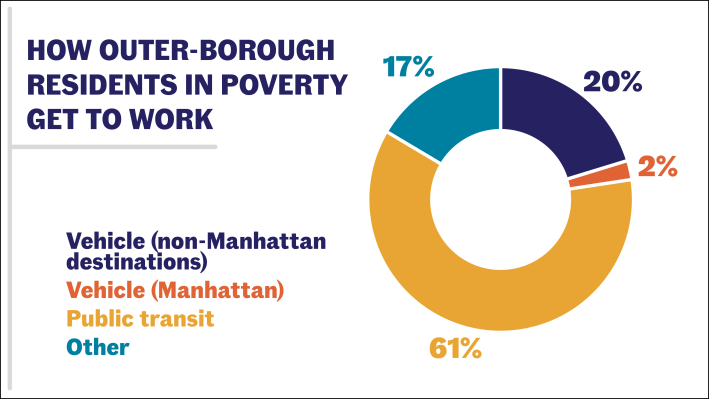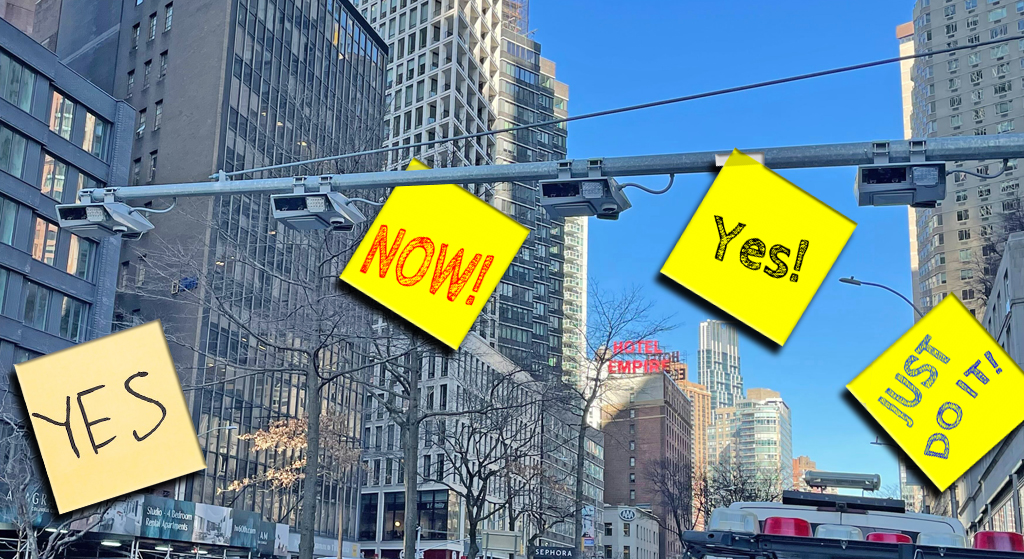They still want congestion pricing and they still want it now.
Supporters of congestion pricing nearly doubled the number of people opposed to the forthcoming tolls during the MTA's final round of public input, according to an internal MTA document that collated comments submitted both online and in person.
Out of 25,628 comments received regarding the proposed $15 peak-hour toll to drive into Manhattan below 60th Street, 15,604 — or 60 percent — expressed support for the toll, its proposed pricing or the concept of congestion pricing generally. The same list showed 8,223 comments — or 32 percent — opposed the toll or its price.
An additional 8 percent of comments were classified as "neutral, questions, irrelevant to the toll altogether, or otherwise unclear," according to the document.
"I strongly support congestion pricing, I think it's marvelous," said Jessica Doyle at during in-person testimony on the toll on March 4. "I'm a sixth-generation New Yorker and I feel that car culture is poisonous to our society. If congestion pricing can help reduce car use, and this psychotic individualism about living our lives in cars, it would be a wonderful thing for everybody."
The heavy support for congestion pricing flies in the face of media coverage of the issue, which focused on naysayers and dissenting voices while ignoring the majority that came out for the final round to support the tolls — just as they did during an earlier round of public commentary.
MTA officials plan to activate the tolls in June, barring an 11th-hour judicial ruling. In recent months, opponents have grown louder in their criticism — if not necessarily greater in number. Two leaders behind the program's passage in 2019 — disgraced ex-Gov. Andrew Cuomo and Transport Workers Union President John Samuelsen — have flip-flopped from their previous support for the toll. In addition, longtime congestion pricing foes like Staten Island Borough President Vito Fossella and talk show host Whoopi Goldberg have claimed that no one wants the toll. United Federation of Teachers President Michael Mulgrew argued that union members can't be expected to take the train
Goldberg, Cuomo and others appear to base their opposition on vibes, but the data clearly show that, given yet another chance to weigh in on congestion pricing, members of the public remain eager to express support
"Not only is congestion pricing popular, even busy people who use public transit took time out of their days to say so," said Riders Alliance Director of Policy and Communications Danny Pearlstein. "Fixing the subway, speeding up buses and cleaning our air matters to New Yorkers and it's time for the NIMBYs to get with the program."
It shouldn't come as a huge surprise that New Yorkers want congestion pricing. After all, legislators who voted for congestion pricing were not swept out of office in a revolt against the toll. And Gov Hochul hitched her wagon to the new tolls during her 2022 election campaign — and won.
Opponents have long claimed that congestion pricing will hurt working-class New Yorkers, but the facts argue otherwise. As the Community Service Society showed, only 2 percent of impoverished outer borough New Yorkers drive to any part Manhattan for work (and fewer to the congestion zone), compared to 61 percent who take public transit.

On the other hand, vast numbers of people who do drive into Manhattan do so because they can find parking for free — either provided by their workplace or through the misuse of placards.
For the people who do rely on public transit, the lawsuits that threaten to derail congestion pricing have real-world impacts: With the $15 billion of congestion pricing money for the MTA's 2020-2024 capital plan delayed, the MTA recently delayed contracts for important signal and junction upgrades.
A spokesperson for the MTA said the public comment results matched the reality of public transit use in the city.
"In a world where the vast majority of commuters use mass transit, it’s not surprising that a solid majority of the public would support a program that improves train and bus service, while also reducing traffic choking Manhattan, and making the air we breathe healthier," said MTA Chief of Policy and External Relations John J. McCarthy.






